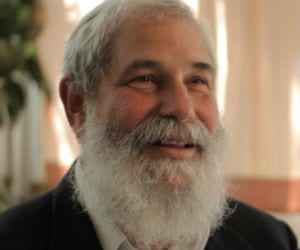
First Thanksgiving Feast Set Stage for Ezekiel Prophecy
Thanksgiving as a secular holiday is an opportunity for families to gather, but the original feast celebrated by the Puritans could very well have been a conscious move towards the coming together of Judah and Israel, as foretold in the Book of Ezekiel. This is not the only scriptural connection; the original Thanksgiving was almost certainly more Biblically inspired than it is today.

“When the Puritans invited the Native Americans to their Thanksgiving feast, it clearly had undertones of the reunion foretold in Ezekiel,” opined Rabbi Tuly Weisz, who made aliyah (immigrated) to Israel several years ago but continues observing this uniquely North American tradition.
Rabbi Weisz, founder of Israel365 News, believes the holiday contains a geula (redemption) element that makes it relevant to the unfolding process he is witnessing in Israel.
“The Puritans were actually foreshadowing the future prophesied reunion of Judah and the Lost Tribes,” he suggested, referring to the long-sought reconciliation between Judah – the Jewish people – and the lost Northern Kingdom of Israel.
And thou son of man take thee one stick and write upon it: For Yehudah and for the children of Yisrael his companions; then take another stick and write upon it: For Yosef the stick of Ephraim and of all the house of Yisrael his companions. Ezekiel 37:16
Rabbi Weisz noted that the Puritans considered their journey to America to be a reenactment of the Biblical Exodus. Indeed, historical documents show that the Puritans compared England, which oppressed them, to Egypt, and referred to the British King James I as ‘Pharaoh’. Their voyage across the Atlantic was compared to the Israelites crossing the Red Sea, after which they arrived at the Promised Land. This theory is supported by historians.
“No Christian community in history identified more with the People of the Book than did the early settlers of the Massachusetts Bay Colony, who believed their own lives to be a literal reenactment of the biblical drama of the Hebrew nation,” wrote noted scholar and chairman of the Jewish Bible Association Gabriel Sivan in his book “The Bible and Civilization.”
The Puritans even speculated that the Native Americans they encountered in the New World might be from the Ten Lost Tribes, a belief that later became common in colonial America.
Though Thanksgiving is a non-religious holiday today, it is doubtful the Puritans celebrated it as such. They were scrupulous about living a Biblically-mandated life and were notoriously anti-Christmas, since it was not mentioned in the Bible. This belief remained prevalent in New England until the mid 1800’s.
Some scholars actually believe the Puritan Thanksgiving feast was modelled after the Jewish holiday of Sukkot, as suggested in a treatise by Dr. Paul Jehle, Executive Director of the Plymouth Rock Foundation.
“The origin of the harvest festival in England by the time the Pilgrims decided to leave was rooted in the Biblical practice of the Feast of Tabernacles (Sukkot),” Dr. Jehle wrote. “Note that we do not know the original date of this event, though most suppose it to be in late October, which would correspond to the time of the Feast of Tabernacles.
“Note also that this day celebrated a harvest, giving thanks to God . . . Also, they feasted and celebrated for three days, thanking God for the provisions God gave them, enjoying it with the Native people.”
The Puritans may have picked up their geula aspirations from their experience with Jews. Initially, they had no exposure to Jews and Judaism. Their native England expelled the Jews in 1290, only permitting them to return in 1657, after the pilgrims had left for the New World. When the pilgrims fled religious oppression in England, they arrived in Holland, where they encountered Jews for the first time.

This contact undoubtedly made a deep impression. The Puritans held their prayer services in an Amsterdam synagogue before establishing their own church in Leyden. They stayed in Holland for ten years and one of their ministers, Henry Ainsworth, studied Jewish Biblical interpretation with the leading Dutch rabbis.
Rabbi Avraham Arieh Trugman, director of Ohr Chadash, a Jewish outreach institute, believes that the Thanksgiving holiday is firmly rooted in Judaism. He explained to Israel365 News that “the act of thanksgiving expresses a major tenet of Jewish belief and practice.”
“The root of the word for Jew, ‘Yehudi’, derived from Judah’s name, is ‘to give thanks’,” said Rabbi Trugman, referring to the Biblical source.
And she conceived again, and bore a son; and she said: ‘This time will I praise Hashem.’ Therefore she called his name Yehudah… Genesis 29:35
“Giving thanks is a major part of a Jew’s daily life,” said Rabbi Trugman, “But it isn’t a once a year thing. Modeh Ani (I thank you) is the first thing a Jew says when he wakes up, and the final section of our thrice-daily silent prayer entails giving thanks and praise. We also say one hundred blessings a day, and therefore express our thanks and praise literally all day long.”
The post First Thanksgiving Feast Set Stage for Ezekiel Prophecy appeared first on Israel365 News.
Israel in the News